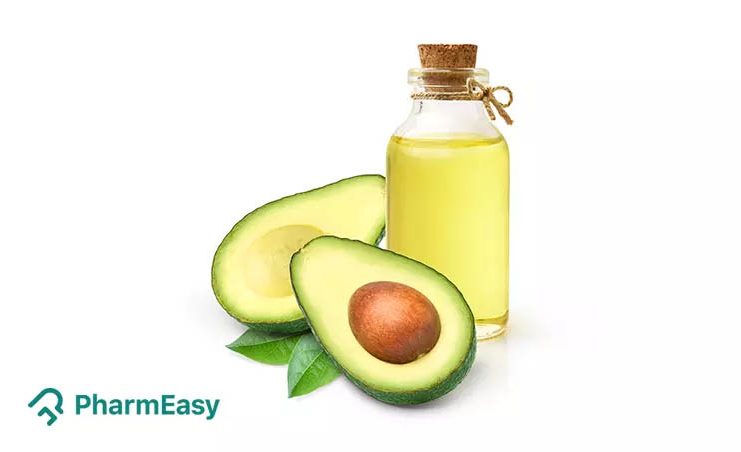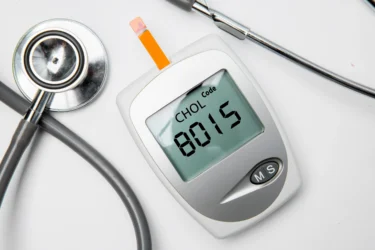Avocado Oil: Uses, Benefits, Side Effects By Dr. Rajeev Singh
By Dr Rajeev Singh +2 more

Get,

to manage your symptom
Get your,


4 Cr+ families
benefitted

OTP sent to 9988776655



You’ve successfully subscribed to receive
doctor-approved tips on
Whatsapp

Get ready to feel your best.

Hi There,
Download the PharmEasy App now!!


Register to Avail the Offer
Send OTPBy continuing, you agree with our Privacy Policy and Terms and Conditions

Hi There,
Sign up on PharmEasy now!!
Trusted by 4 crore+ families

OTP sent to 9988776655



You have unlocked 25% off on medicines




Code: NU25
By Dr Rajeev Singh +2 more
Table of Contents
Have you relished avocado toast or guacamole at a brunch party? Isn’t it amusing that oil extracted from the flesh of avocado fruit may have several benefits for health? The scientific name of avocado is Persea americana, which belongs to the Lauraceae family. Avocado oil is extracted from avocado fruit by the cold-press method. Even 16th-century literature has reported use of avocado oil. Avocado oil is highly popular in the cosmetic industry due to the presence of high levels of vitamin E. Avocado oil is usually extracted from the Hass type of avocado which is grown in several countries like the United States, Chile, Mexico, Spain, New Zealand, etc1,2. Let us look at some avocado oil health benefits.

Avocado oil may contain several bioactive compounds like fatty acids, sterols, tocopherols, tocotrienols, phenolics, carotenoids, and chlorophylls1. Additionally, avocado oil may contain the following components:
From my knowledge, lutein and vitamin E, essential for healthy eyes and skin, are found in avocado oil. Researchers believe that particularly lutein is believed to guard against age-related macular degeneration, that may cause vision loss and even blindness11.
Dr. Siddharth Gupta, B.A.M.S, M.D (Ayu)
Some avocado oil properties are given below:
Some of the possible uses of avocado oil are:

A study14 by Hernandez et al. In 2016 showed that avocado oil might be beneficial in reducing bad cholesterol levels- LDL (low-density lipoproteins) and total cholesterol. Avocados may possess cholesterol-lowering activities due to mono-unsaturated fatty acid (MUFA) and phytosterols2. However, further studies are required to check if avocado oil may help to reduce cholesterol levels. Therefore, you must check your doctor in case of high cholesterol levels.

A study13 by Furlan et al. in 2017 showed that a diet including avocado oil might help to reduce the levels of triglycerides (harmful fats), which may help to lower the risk of obesity. Excessive fat accumulation in the body may lead to diseases like diabetes, hyperlipidemia, and heart disease; therefore, it is vital to maintain a healthy weight2. However, further studies are yet to be done to check if avocado oil may help manage weight. Therefore, you must consult your dietician before making any changes in your diet.

In study4 conducted on rats showed that avocado oil might reduce blood pressure. This may be due to bioactive compounds like oleic acid, which may get incorporated into the cell wall and may control blood pressure2,4. However, more studies on humans are required to confirm if avocado oil may be used to regulate blood pressure. Therefore, you must check your blood pressure regularly and consult your doctor in case of high blood pressure.

A study5 by Avila et al. in 2015 showed that avocado oil might help normalize total cholesterol and triglyceride levels (harmful fats) caused due to diabetes2,5. Another study by Equihua et al. in 2016 showed that avocado oil might reduce insulin resistance Insulin is a hormone that may control the amount of sugar in the blood. With insulin resistance, the glucose might not enter the body cells and is built up in the blood. This may lead to high blood glucose levels. Additionally, oleic acid in avocado oil may help the secretion of specific proteins that can produce insulin2. However, more studies on humans are required to confirm if avocado oil can be used in diabetes. Therefore, you must check your blood sugar levels regularly and consult your doctor in case of high blood sugar levels.

A study6 by Pepa et al. in 2017 showed that fatty acids like mono-unsaturated fatty acids might help to protect the liver. Another study by Sato et al. in 2015 showed that tocopherols in avocado oil might help reduce oxidative stress on the liver2,6. However, more studies are required in humans. Therefore, you must consult your doctor if you have any symptoms of liver disease.

A study7 by Santos et al. in 2018 showed that avocado oil might act against gram-negative bacteria by penetrating through the cell walls of the bacteria. The anti-microbial property of avocado oil may be due to bioactive compounds like tocopherols, carotenoids, β-sitosterol, and terpenoids2,7. However, large-scale studies are yet to be done. Therefore, you must consult your doctor if you suspect any bacterial infection.

One of the features of psoriasis is the development of an itchy rash on the skin. A study8 by Stucker et al. in 2001 showed that topical application of a cream containing vitamin B12, and avocado oil might be beneficial for psoriasis. However, more research is required to check if avocado oil may be used for psoriasis. Therefore, you must consult your doctor and not self-medicate if you have psoriasis.
Though studies show the benefits of avocado oil in various conditions, these are insufficient, and there is a need for further studies to establish the true extent of the benefits of avocado oil on human health.
In my experience, ASU (Avocado Soy Unsaponifiables) may be a wonder ingredient to their food for people with osteoarthritis. Researchers believe that ASU, produced by mixing soybean and avocado oil may be used as an alternate anti-inflammatory therapy to cope with osteoarthritis12.
Dr. Rajeev Singh, BAMS
Avocado oil can be included in the diet in the following way:
You must consult a qualified doctor before taking avocado oil in large quantities or any herbal supplements. Do not discontinue or replace an ongoing treatment of modern medicine with an ayurvedic/herbal preparation without consulting a qualified doctor.
Also Read: Maple Syrup: Uses, Benefits, Side Effects By Dr. Smita Barode
Some clinical trials have shown that the following side effects may occasionally be associated with avocado oil:
You must immediately consult your doctor if you experience any side effects after consuming avocado oil.
Also Read: Coconut Oil: Uses, Benefits, Side Effects By Dr. Rajeev Singh
Avocado oil, being a natural substance is relatively safe to consume. However, as with all other substances, pregnant and lactating mothers shall be cautious before using avocado oil in any form. It is best to consult your doctor before doing so.
Avocado oil may interact with warfarin, a drug that prevents abnormal blood clotting10. You must consult your doctor before consuming avocado oil if you are undergoing any medical treatment.
Also Read: Avocado Oil vs Olive Oil: Health Benefits, Nutrition, and Best Uses
Avocado oil may lower cholesterol, manage weight, regulate blood pressure, and protect the liver. It may act against diabetes, microbial infection, and psoriasis. However, you must consult your doctor if you have any disease instead of self-medicating2,4,8.
Avocado oil may contain bioactive compounds like oleic acid, linoleic acid, and palmitic acid which may help to keep the skin moisturized. It may also contain vitamin E, lecithin, and potassium, which may nourish and detoxify the skin. Phytosterols present in avocado oil may help to rejuvenate stressed skin8.
Avocado oil may contain fatty acids, choline, and vitamins E, carotenoids, sterols and many more1,3.
Avocados may lower bad cholesterol levels due to mono-unsaturated fatty acid (MUFA) and phytosterols like β-sitosterols. You must check your cholesterol levels regularly and consult your doctor in case of high cholesterol levels2.
Avocado oil may interact with warfarin, a drug that prevents blood clots10. You must consult your doctor before consuming avocado oil if you are undergoing medical treatment for prevention of blood clots.
Disclaimer: The information provided here is for educational/awareness purposes only and is not intended to be a substitute for medical treatment by a healthcare professional and should not be relied upon to diagnose or treat any medical condition. The reader should consult a registered medical practitioner to determine the appropriateness of the information before consuming any medication. PharmEasy does not provide any guarantee or warranty (express or implied) regarding the accuracy, adequacy, completeness, legality, reliability, or usefulness of the information; and disclaims any liability arising thereof.
Links and product recommendations in the information provided here are advertisements of third-party products available on the website. PharmEasy does not make any representation of the accuracy or suitability of such products/services. Advertisements do not influence the editorial decisions or content. The information in this blog is subject to change without notice. The authors and administrators reserve the right to modify, add, or remove content without notification. It is your responsibility to review this disclaimer regularly for any changes.
Comments

Leave your comment...
You may also like
Comments